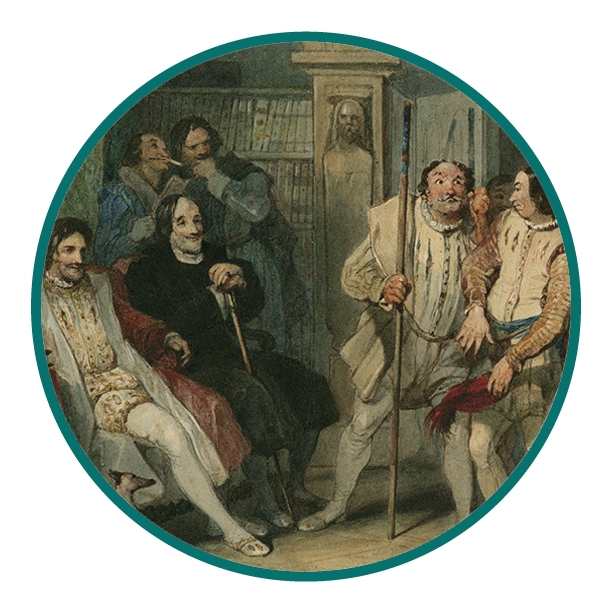Shakespeare in Brown’s Libraries
Shakespeare for All Readers

William Shakespeare is probably the most written-about, edited, and reprinted writer in English. Editions of his collected plays date from the First Folio itself in 1623; single volumes of his plays, called quartos, were published from the beginning of his career, in the 1590’s. At first, his poems and sonnets were printed separately from his plays. His works continue to be edited for different kinds of readers, from grade school children to college students to scholars to general readers to actors. From the 18th century onward, his plays have lent themselves to parodies, burlesques, and creative rewriting.
Along with the works themselves, commentaries and interpretations, biographies, and journals devoted to scholarly criticism of his writings have proliferated. Translations in hundreds of languages exist. In non-verbal media, his works have inspired songs, operas and other musical forms, as well as paintings, drawings, prints, and sculpture. Beginning with silent films in the 19th century, every one of his plays exists in a film version, and they are often performed on television. We can also view live theatrical performances—from the National Theatre in London, for example—in cinemas.
With the advent of digital technology, we are no longer dependent on rare book libraries or special collections for acquaintance with the earliest editions, the quartos, the First Folio, the three subsequent Folios, and the major editions of the collected or complete works that began with Nicholas Rowe’s in 1709, and went through the 18th century. We can access these editions online, and compare their different versions of what Shakespeare wrote.
Much Ado About Nothing
Anyone who wants to explore this vast field of Shakespeareana will find all of these forms richly represented in Brown’s libraries. Under Hamlet, for example, 229 items are listed in the online catalog, including the Russian translation by Boris Pasternak, the opera by Ambroise Thomas, and the 2001 film starring Ethan Hawke, Liev Schreiber, and Sam Shephard. To describe Brown’s Shakespeare resources even in general terms would take many words. Therefore, we have chosen a play from the middle of the poet’s career, Much Ado About Nothing, published in 1600, to exemplify the resources available in our libraries to a reader who wishes to immerse herself in the play’s many incarnations.
Much Ado in Print
Josiah, the online catalog for all Brown libraries, has fifty entries for the play as a single text. Readers can see both its First Folio and quarto editions through the electronic resource LION, Literature Online. They can also read it on paper in the major scholarly editions–Arden, Cambridge, Oxford—which include up to date scholarly commentaries and information of many kinds. If they want a quicker introduction to Much Ado, they can check out one of the well-prepared paperback editions for the general reader, such as the Penguin, or the Norton. Spanish speakers might be interested in Mucho Ruido y Pocas Nueces, a bilingual edition.
Much Ado on Video
Readers who want to see the play performed will find several video versions. In 1972, the Public Theater’s production of Much Ado, under the direction of Joseph Papp, became a Broadway hit starring Sam Waterston and Kathleen Widdoes. The BBC, in collaboration with Time-Life, Inc., produced videos of all Shakespeare’s plays during the 1980’s: Much Ado came out in 1988. Kenneth Branagh’s film version of 1993, filmed in Tuscany and starring several American screen stars (Denzel Washington, Keanu Reeves), was a popular and critical success. The most recent version (2013), directed by Joss Whedon of “Buffy the Vampire Slayer” fame, is filmed in black and white, and set in contemporary Santa Monica.
Recordings of Much Ado
At Orwig Music Library, listeners will find three recorded versions of the play, one of them starring Rex Harrison of My Fair Lady fame. With earphones, they can listen and follow a printed text at the same time. The musically inclined can also listen to Erich Korngold’s orchestral suite inspired by the play.
Credits:
Much Ado About Nothing, IV, 2 [graphic], by Stephanoff, Francis Philip. Folger Shakespeare Library.
